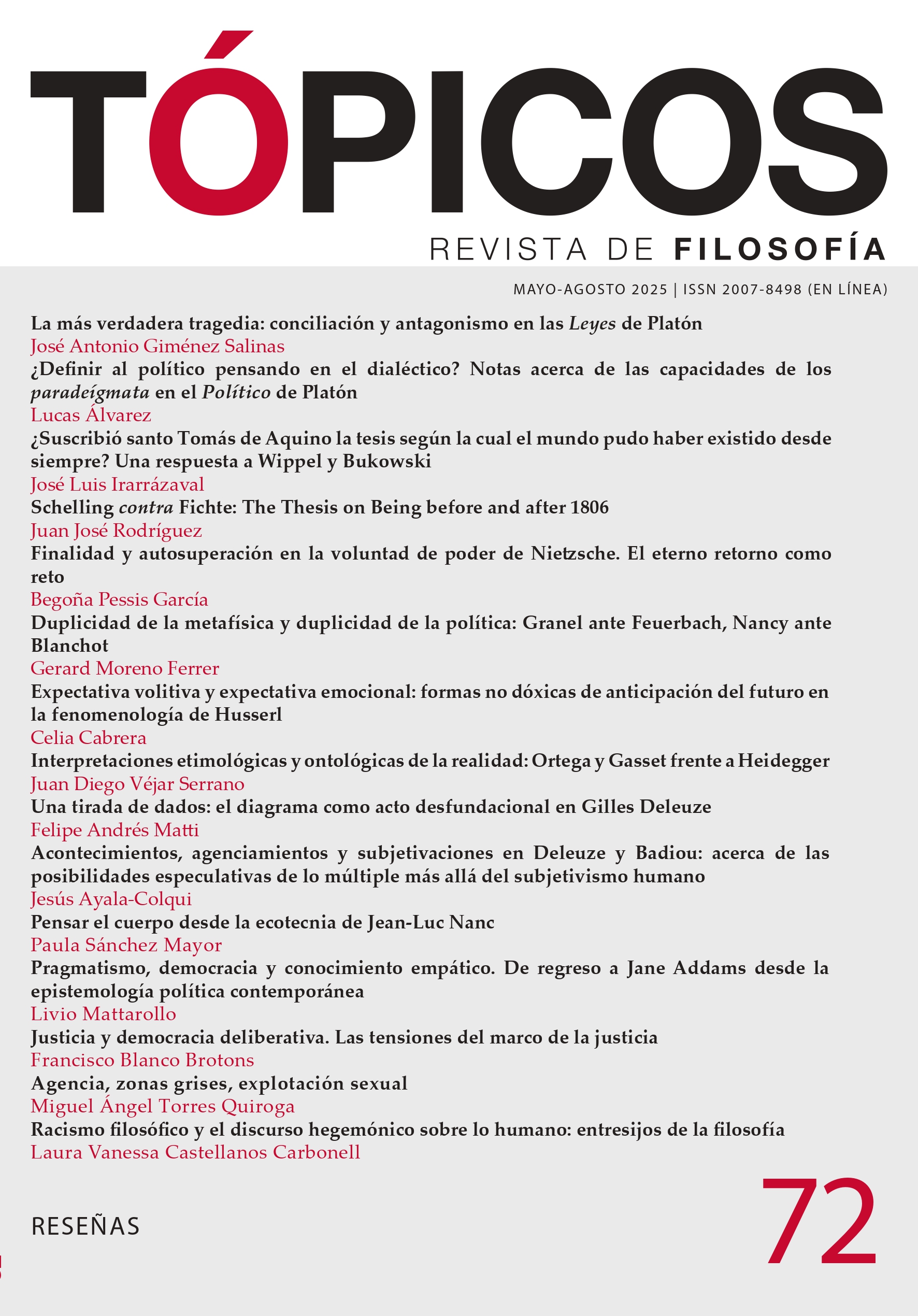La más verdadera tragedia: conciliación y antagonismo en las Leyes de Platón
Pubblicato 2025-02-19
Parole chiave
- tragedia,
- antigua querella entre filosofía y poesía,
- Leyes,
- mímesis
Copyright (c) 2025 Tópicos, Revista de Filosofía

Questo volume è pubblicato con la licenza Creative Commons Attribuzione - Non commerciale - Non opere derivate 4.0 Internazionale.
Come citare
Abstract
Este artículo examina la querella con los poetas trágicos de Leyes, VII 817b-d. Subrayo, por una parte, diferencias fundamentales con la más célebre querella de la República; sostengo, por otra, una lectura fuerte (y no meramente retórica) de la afirmación central del pasaje, a saber, que la constitución política propuesta en el diálogo es ella misma la “más verdadera tragedia”. Asumiendo esta perspectiva, muestro que la constitución de Magnesia es la mejor tragedia posible en cuanto posibilita la mayor realización de la vida de la comunidad, reconociendo, apelando e integrando en sí las pasiones y debilidades humanas. Se presenta ahí una noción de “tragedia” que, si bien reconoce como punto de partida la conflictividad propia del género trágico, aspira a la felicidad común como la más bella culminación del drama humano.
Riferimenti bibliografici
- Aristóteles. (1957). Metaphysica. W. Jaeger (ed.). Oxford University Press.
- Aristóteles. (2010). De Arte Poetica Liber. R. Kassel (ed.). Oxford University Press.
- Bartels, M. R. (2017). Plato’s Pragmatic Project. A Reading of Plato’s Laws. Franz Steiner Verlag. https://doi.org/10.25162/9783515118057
- Capra, A. (2014). Plato’s Four Muses: The Phaedrus and the Poetics of Philosophy. Center for Hellenic Studies.
- Delgado, C. (2011). Indicios de una rehabilitación de la literatura en Platón a propósito de Leyes, 809e2-812b1 y 817a1-e1. Nova Tellus, 29(2), 87-115. https://doi.org/10.19130/iifl.nt.2011.29.2.388
- Derrida, J. (1972). La dissémination. Éditions du Seuil.
- Epicteto. (1916). Dissertationes ab Arriano digestae. H. Schenkl (ed.). Teubner.
- Diógenes Laercio (1972). Lives of Eminent Philosophers. Books 1-5. R. D. Hicks (trad.). Loeb Classical Library. Harvard University Press.
- Gadamer, H.-G. (1985). Platon und die Dichter. En Gesammelte Werke. 5. Griechische Philosophie. I (pp. 187-211). Mohr Siebeck.
- Giménez, J. A. (2019). La psicología moral de la marioneta. Conflicto y acuerdo en las Leyes de Platón. Ideas y Valores, 68(171), 137-159. https://doi.org/10.15446/ideasyvalores.v68n171.64537
- Giménez, J. A. (2021). El criterio del placer en las Leyes V 733a-734e. Méthexis, 33, 80-101. https://doi.org/10.1163/24680974-03301004
- Halliwell, S. (1984). Plato and Aristotle on the Denial of Tragedy. Proceedings of the Cambridge Philological Society, 30, 49-71. https://doi.org/10.1017/S0068673500004612
- Halliwell, S. (1996). Plato’s Repudiation of the Tragic. En M. S. Silk (ed.), Tragedy and the Tragic (pp. 332-349). Oxford University Press. https://doi.org/10.1093/oso/9780198149514.003.0022
- Halliwell, S. (2002). The Aesthetics of Mimesis: Ancient Texts and Modern Problems. Princeton University Press. https://doi.org/10.1515/9781400825301
- Heidegger, M. (1996). Gesamtausgabe. I. Abteilung: Veröffentliche Schriften 1910-1976. Band 6.1. Nietzsche. Vittorio Klostermann.
- Kuhn, H. (1941). The True Tragedy: On the Relationship between Greek Tragedy and Plato, I. Harvard Studies in Classical Philology, 52, 1-40. https://doi.org/10.2307/310955
- Kurke, L. (2013). Imagining Chorality: Wonders, Plato’s Puppets and Moving Statues. En A.-E. Peponi (ed.), Performance and Culture in Plato’s Laws (pp. 123-170). Cambridge University Press. https://doi.org/10.1017/CBO9781139061674.008
- Laks, A. (2008). The Laws. En C. Rowe y M. Schofield (eds.), The Cambridge History of Greek and Roman Political Thought (pp. 258-292). Cambridge University Press.
- Laks, A. (2010). Plato’s Truest Tragedy. En C. Bobonich (ed.), Plato’s Laws. A Critical Guide (pp. 217-231). Cambridge University Press.
- Laks, A. (2022). Plato’s Second Republic. An Essay on the Laws. Princeton University Press. https://doi.org/10.2307/j.ctv269fw2b
- Lisi, F. (1985). Einheit und Vielheit des platonischen Nomosbegriffes. Verlag Anton Hein.
- Männlein-Robert, I. (2013). Poetik: Komödie und Tragödie (VII 796e-817e) En C. Horn (ed.), Platon: Gesetze/Nomoi (pp. 123-142). Akademie Verlag. https://doi.org/10.1524/9783050064482.123
- Máximo de Tiro. (1994). Dissertationes. M. B. Trapp (ed.). Teubner.
- Meyer, S. S. (2011). Legislation as a Tragedy: On Plato’s Laws VII, 817B–D. En P. Destrée y F.-G. Herrmann (eds.), Plato and the Poets (pp. 387-402). Brill. https://doi.org/10.1163/ej.9789004201293.i-434.91
- Müller, J. (2013). Der Mensch als Marionette: Psychologie und Handlungstheorie. E n C. Horn (ed.), Platon: Gesetze/Nomoi (pp. 45-66). Akademie Verlag. https://doi.org/10.1524/9783050064482.45
- Naddaf, G. (2000). Literary and Poetic Performance in Plato’s Laws. The Society for Ancient Greek Philosophy Newsletter, 312, 1-15. https://orb.binghamton.edu/sagp/312
- Nietzsche, F. (1973). El nacimiento de la tragedia. A. Sánchez Pascual (trad.). Alianza.
- Nightingale, A. (1993). Writing/Reading a Sacred Text: A Literary Interpretation of Plato’s Laws. Classical Philology, 88(4), 279-300. https://doi.org/10.1086/367372
- Platón. (1901). Opera. II. Tetralogiae III-IV. J. Burnet (ed.). Oxford University Press.
- Platón. (1903). Opera. III. Tetralogiae V-VII. J. Burnet (ed.). Oxford University Press.
- Platón. (1907). Opera. V. Tetralogia IX. J. Burnet (ed.). Oxford University Press.
- Platón. (1926). Laws. R. G. Bury (trad.). Harvard University Press.
- Platón. (1978). Opera. IV. Tetralogia VIII. J. Burnet (ed.). Oxford University Press.
- Platón. (1982). Diálogos. IV. C. Eggers Lan. (trad.). Gredos.
- Platón. (1999). Diálogos IX. Leyes (libros VII-XII). F. Lisi (trad.). Gredos.
- Platón. (2004). The Laws. T. J. Saunders (trad.). Penguin Classics.
- Platón. (2016). Laws. M. Schofield (ed.). T. Griffith (trad.). Cambridge University Press.
- Plotino. (1966). Enneads I-VI. A. H. Armstrong (trad.). Harvard University Press. https://doi.org/10.4159/DLCL.plotinus-enneas.1969
- Pfefferkorn, J. (2021). Plato’s Dancing City: Why is Mimetic Choral Dance so Prominent in the Laws? En J. Pfefferkorn y A. Spinelli (eds.), Platonic Mimesis Revisited (pp. 335-358). Academia. https://doi.org/10.5771/9783896659798-335
- Schöpsdau, K. (1994). Platon. Nomoi. Buch 1-3. Übersetzung und Kommentar. Vandenhoek & Ruprecht.
- Schöpsdau, K. (2003). Platon. Nomoi. Buch 4–7. Übersetzung und Kommentar. Vandenhoek & Ruprecht.
- Stalley, R. (1995). Punishment in Plato’s Laws. History of Political Thought, 16(4), 469-487.
- Strauss, L. (1975). The Argument and the Action of Plato’s Laws. The University of Chicago Press.






